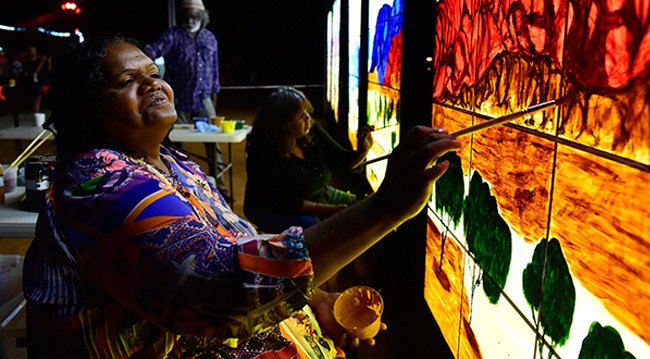The AICD affirms its commitment to reconciliation values.
In Central and Eastern Arrernte, the country in and around Alice Springs and the East MacDonnell Ranges, the word apateme means “to have trouble understanding something” while pwarrtyeme means “to shine”. So when senior Arrernte people came to name the festival of light that illuminates the mountain range each September, they selected the term “Parrtjima”.
“The Parrtjima name suggests shedding both light and understanding on a subject, which is exactly what our Reconciliation Action Plan (RAP) will do for AICD,” said Chairman Elizabeth Proust AO FAICD. Proust joined Alice Springs directors at Parrtjima to mark the important step of committing to reconciliation recently taken by the Australian Institute of Company Directors’ (AICD) board.
Reconciliation Action Plans are business plans that outline what an organisation commits to do as its contribution to reconciliation. They are increasingly becoming part of the governance framework for organisations such as major listed companies, not-for-profits and government departments. Under a RAP, an organisation pledges to take (and measure) actions that build respectful relationships with and create opportunities for Aboriginal and Torres Strait Islander peoples.
Reconciliation Australia, the independent not-for-profit that oversees the national RAP initiative, aims to have a majority of ASX 200 as well as major private companies and multinationals implement action plans. Qantas, Telstra, BHP Billiton, Rio Tinto, Microsoft Australia and the four major banks are among those participating. The Commonwealth Bank, ANZ and BHP Billiton have had RAPs for a decade.
The AICD plan, developed over 12 months, is closely aligned with the organisation’s strategy and capitalises on its defining strengths: governance expertise and leadership.
“Over the next three years, we commit to consolidating and growing the number of meaningful, respectful relationships with Aboriginal and Torres Strait Islander directors, their organisations and their communities,” Proust told the Alice Springs audience. “We commit to raising cultural awareness by increasing the recognition of Aboriginal and Torres Strait Islander peoples, their histories and their contributions. Finally, we commit to improving Indigenous peoples’ access to quality governance education, with the view to enabling them to direct and lead sustainable and successful organisations.”
The RAP builds on work that the AICD has already done in these areas. It has offered a specialised version of the flagship Company Directors Course for Indigenous business leaders, for example, and many emerging Indigenous directors have completed AICD programs as scholarship recipients.

The AICD’s advisory team has also worked with the Ngurra Kujungka Council — which leads the development and delivery of the Western Desert’s first community-driven regional sports and recreation program — to improve reporting processes and help members develop a better understanding of their roles. The AICD delivered a six-course program over 18 months alongside quarterly council meetings and sports events. Facilitator David Evans FAICD, who has extensive experience in Indigenous governance training, acted as a mentor.
Adopting a RAP
In adopting a RAP, the AICD recognises that it can do much more to empower, educate, learn from, collaborate and connect with Australia’s Indigenous peoples. The three-year plan sets out initiatives to embed reconciliation values across the organisation, from featuring Indigenous governance stories in Company Director magazine to reviewing Indigenous-governance education programs and developing a strategy to attract more Aboriginal and Torres Strait Islander members.
The AICD’s RAP working group includes representatives from the Arnhem Land Progress Aboriginal Corporation (ALPA), which was established in 1972 as a cooperative of community stores in Arnhem Land and has now become the largest Aboriginal corporation in Australia, operating in 27 remote locations across the Northern Territory and Queensland. ALPA and the AICD have previously worked together on the delivery of Indigenous governance programs.
It will take an all-of-organisation approach involving AICD staff and members if the RAP is to make a meaningful difference, Parrtjima curator Rhoda Roberts AO said at the Parrtjima members’ event. Roberts, a Bundjalung woman, is the head of First Nations Programming at the Sydney Opera House, which is now implementing its fourth RAP since 2011.
Initially, Roberts was sceptical of the Opera House’s plan. “I was very dismissive because it’s a bit of bureaucracy — and where was the creative?” she says. “Six years on, I have to say it is one of the greatest documents and tools we have because it really keeps us in check.”
But it takes a truly concerted effort, she warned. “Unless there is commitment from the whole organisation, so every sector of your company is attending to the RAP, that’s the only way it can work. If it’s just a section of people, it filters out. But if you have a whole-of-organisation commitment, it’s extraordinary what it can bring.”
Reconciliation Action
• 767 organisations have created a RAP since 2006.
• 6658 partnerships exist between RAP organisations and Aboriginal and Torres Strait Islander communities.
• 46,446 employees have participated in face-to-face cultural awareness training.
Benefits of a RAP
A Reconciliation Action Plan gives an organisation the best chance of achieving Aboriginal and Torres Strait Islander engagement objectives and delivering broader outcomes, including:
• the opportunity to become an employer of choice for Aboriginal and Torres Strait Islander peoples
• a more dynamic, innovative and diverse workforce
• a workplace that is culturally safe and tolerant
• access to new markets and better penetration of existing markets
• better service delivery to Aboriginal and Torres Strait Islander peoples and communities
• the opportunity to contribute to new projects, industries, services, products and ways of doing business.
Source: Reconciliation Australia
Latest news
Already a member?
Login to view this content


